
Nigerian literature may be roughly defined as the literary writing by citizens of the nation of Nigeria for Nigerian readers, addressing Nigerian issues. This encompasses writers in a number of languages, including not only English but Igbo, Urhobo, Yoruba, and in the northern part of the county Hausa and Nupe. More broadly, it includes British Nigerians, Nigerian Americans and other members of the African diaspora.
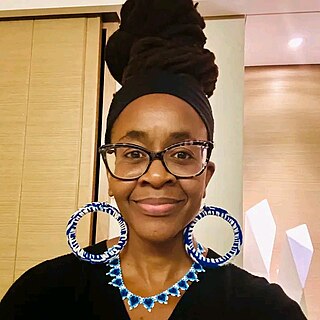
Nnedimma Nkemdili "Nnedi" Okorafor is a Nigerian American writer of science fiction and fantasy for both children and adults. She is best known for her Binti Series and her novels Who Fears Death, Zahrah the Windseeker, Akata Witch, Akata Warrior, Lagoon and Remote Control. She has also written for comics and film.

Martha Wells is an American writer of speculative fiction. She has published a number of fantasy novels, young adult novels, media tie-ins, short stories, and nonfiction essays on fantasy and science fiction subjects. Her novels have been translated into twelve languages. Wells has won four Hugo Awards, two Nebula Awards and three Locus Awards for her science fiction series The Murderbot Diaries. She is also known for her fantasy series Ile-Rien and The Books of the Raksura. Wells is praised for the complex, realistically detailed societies she creates; this is often credited to her academic background in anthropology.

Sefi Atta is a Nigerian-American novelist, short-story writer, playwright and screenwriter. Her books have been translated into many languages, her radio plays have been broadcast by the BBC, and her stage plays have been performed internationally. Awards she has received include the 2006 Wole Soyinka Prize for Literature in Africa and the 2009 Noma Award for Publishing in Africa.
Epaphras Chukwuenweniwe Osondu, predominantly known as E. C. Osondu, is a Nigerian writer known for his short stories. His story Waiting won the 2009 Caine Prize for African Writing, for which he had been a finalist in 2007 with his story Jimmy Carter's Eyes. Osondu had previously won the Allen and Nirelle Galso Prize for Fiction and his story A Letter from Home was judged one of "The Top Ten Stories on the Internet" in 2006.
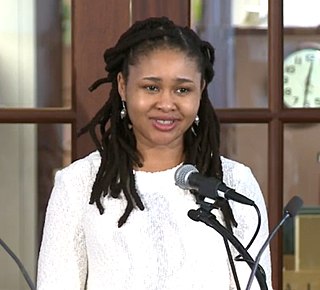
Chinelo Okparanta is a Nigerian-American novelist and short-story writer. She was born in Port Harcourt, Nigeria, where she was raised until the age of 10, when she emigrated to the United States with her family.
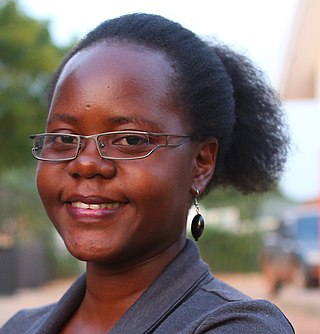
Ber Anena born and previously published as Harriet Anena is a Ugandan writer and performer, whose writing includes poetry, nonfiction and fiction. She is the author of a collection of poems, A Nation In Labour, published in 2015, won the 2018 Wole Soyinka Prize for Literature in Africa. The Economist described her poetry performance as "an arresting evocation of love and war".

Chigozie Obioma is a Nigerian writer who wrote the novels The Fishermen (2015) and An Orchestra of Minorities (2019), both of which were shortlisted for the Booker Prize in their respective years of publication. His work has been translated into more than 30 languages. His third novel, The Road to the Country, was published in 2024, and was described by The Guardian as having "given a voice" to the victims of the Nigerian civil war.

Dami Ajayi is a Nigerian writer, poet and medical doctor who co-founded Saraba, a Nigerian literary magazine in 2008.
Lesley Nneka Arimah is a Nigerian writer. She has been described as "a skillful storyteller who can render entire relationships with just a few lines of dialogue" and "a new voice with certain staying power." She is the winner of the 2015 Commonwealth Short Story Prize for Africa, the 2017 O. Henry Prize, the 2017 Kirkus Prize, and the 2019 Caine Prize for African Writing.
Oyinkan Braithwaite is a Nigerian-British novelist and writer. She was born in Lagos and spent her childhood in both Nigeria and the UK. Braithwaite is best known for her debut novel My Sister, the Serial Killer.

Pemi Aguda is a Nigerian writer known for her short stories and debut collection Ghostroots (2024). Her work often explores complex themes surrounding motherhood, identity, and the supernatural. Ghostroots, which includes previously-published stories such as "Breastmilk" and "The Hollow", was a finalist for the 2024 National Book Award for Fiction and received critical acclaim for its unifying themes and narrative cohesion.

The Nommo Awards are literary awards presented by The African Speculative Fiction Society. The awards recognize works of speculative fiction by Africans, defined as "science fiction, fantasy, stories of magic and traditional belief, alternative histories, horror and strange stuff that might not fit in anywhere else."

Uzoamaka Aniunoh is a Nigerian actor, writer, and director.
Africanfuturism is a cultural aesthetic and philosophy of science that centers on the fusion of African culture, history, mythology, point of view, with technology based in Africa and not limiting to the diaspora. It was coined by Nigerian American writer Nnedi Okorafor in 2019 in a blog post as a single word. Nnedi Okorafor defines Africanfuturism as a sub-category of science fiction that is "directly rooted in African culture, history, mythology and point-of-view..and...does not privilege or center the West," is centered with optimistic "visions in the future," and is written by "people of African descent" while rooted in the African continent. As such its center is African, often does extend upon the continent of Africa, and includes the Black diaspora, including fantasy that is set in the future, making a narrative "more science fiction than fantasy" and typically has mystical elements. It is different from Afrofuturism, which focuses mainly on the African diaspora, particularly the United States. Works of Africanfuturism include science fiction, fantasy, alternate history, horror and magic realism.
Oghenechovwe Donald Ekpeki is a Nigerian speculative fiction writer, editor and publisher who was the first African-born Black author to win a Nebula Award. He has also received a World Fantasy Award, British Fantasy Award, Otherwise Award, and two Nommo Awards, along with being a multi-time finalist for a number of other honors, including the Hugo Award.
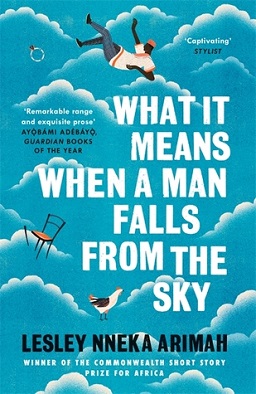
What It Means When a Man Falls from the Sky is a collection of short stories by Nigerian writer Lesley Nneka Arimah, initially published in April 2017 by Riverhead Books and Tinder Press (UK), then republished in Nigeria by Farafina Books in November 2017.
Oluwole Talabi is a Nigerian science fiction writer, engineer, and editor, who is considered among the Third Generation of Nigerian Writers.

Africanfuturism: An Anthology is an Africanfuturism anthology edited by Nigerian author Wole Talabi. It contains eight works of short fiction, plus an introduction written by Talabi. It was published by Brittle Paper in October 2020.
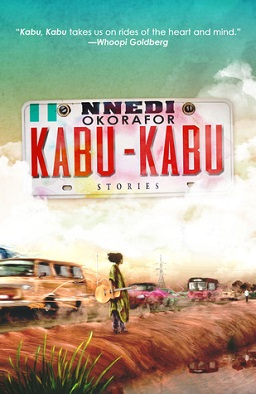
Kabu Kabu is a speculative fiction short story collection written by Nigerian American writer Nnedi Okorafor with stories in both Africanfuturism and Africanjujuism styles and themes. The collection was first published in 2013 by Prime Books.













